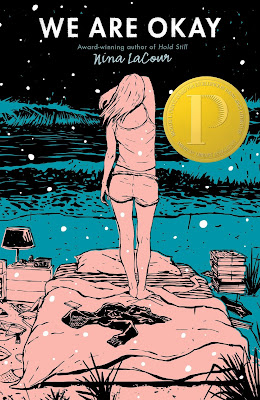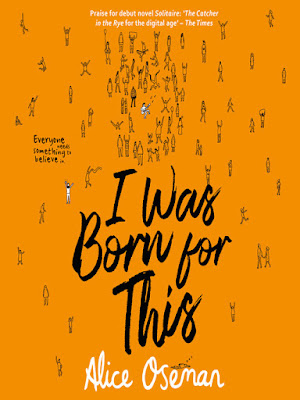Book Review: We Are Okay
We Are Okay
By Nina LaCour
(Finished reading: 30/05/2020)
5/5 stars
Exquisite, emotive, excellent.
“The truth was unconfined, unadorned. There was no poetic
language to it, no yellow butterflies, no epic floods. There wasn't a town
trapped underwater or generations of men with the same name destined to make
the same mistakes. The truth was vast enough to drown in.”
I’m struggling to decide how to describe what this book is
about, in fear of not doing it justice. I suppose it is a book about grief, loneliness
and relationships. I think that’s all you really need to know going in as too
much would be too much. For me, this book resembles a fine wine, it deserves to
be sipped and savoured, not rushed or disturbed. So enjoy the taste without too
many preconceptions or distractions. My review will not linger on any
specifics, but I hope to convey why I loved reading it the best I can without
going in to too much detail.
Firstly, I just wanted to address how beautiful the cover
art for this book is. For some reason, the artwork really speaks to me, I
notice different details each time I look at it and I think it captures the
whole story so perfectly. I love the illustrated cover artworks the most so
this is most likely why I am drawn to it. I would honestly frame this on my
wall if I had a print of this. I appreciate the cover art has little to do with
the writing inside so I will swiftly move on, I just wanted to address it for
anyone who cares about pretty-looking books!
I have never read any of Nina LaCour’s books before but found
myself instantly clicking with her writing style. I cannot describe exactly
what it is that made it feel right because the writing is mostly very simple and
there wasn’t anything particularly unusual about it. But she told the story so
beautifully. I liked that it was less than 300 pages because nothing felt too
dragged out or unnecessary. Everything that was included felt crucial to the
story and this was so nice to read. I liked how the story flicked between past
and present, I thought this was handled really well. I’m often sceptical when
writers do this as it is often unnecessary or just plain confusing. But I loved
how LaCour created two distinctive tones between the two time periods and two
places. The transition between the two felt very effortless but the contrast
was very effective. In particular, I felt a real sense of warmness reading the
chapters set in the past and a sense of coldness whilst reading the chapters set
in the present. I thought this set up the contrasting tones perfectly.
In the acknowledgements, LaCour addresses how this story
emerged from her own grandfather’s death. This experience with grief felt very
clear whilst reading the novel. I’m sure anyone whose ever lost a loved one can
relate to Marin’s thoughts, emotions and actions. LaCour describes grief so
beautifully and organically and I loved reading every word. Not only this, but
I felt a really genuine representation of what it is to feel lonely and
isolated. Somehow the snowy setting amplified all these feelings with a real
sense of emptiness. And yet, despite all these themes, it never felt overly
dark or depressing at all. All the way through you can feel a glimmer of hope
and the chapters set in the past help to balance out darkness with splashes of
sunlight.
I also really appreciated the literary and art references. They
felt careful and deliberate at opposed to thrown into the mix. The liked how
the artworks mentioned tied in with the themes in the story. This seems like a
pretty obvious thing to say, but this isn’t always managed so well in every
novel. It actually made me want to look up the artworks and literature
mentioned as I’m sure those who are familiar with these pieces can probably take
away something deeper beneath the surface-level. Although, as someone who wasn’t
familiar with many of these references, I still appreciated why they were there
and what they were portraying. They certainly made the writing feel more
literary and deepened the themes that were already established.
I loved how LaCour represented all sorts of relationships
throughout the book. The story is focused on grandparents, parents and young
adults. I think for this reason, it’s a novel that would appeal to many ages, especially
as the themes are so universal to every stage of life. I liked the dynamic relationships
between the characters and found this was more important than the plot—which I
loved. I’ve always preferred character-driven novels over plot-driven novels
and this one is certainly character-focused. Having said this, the plot was
structured really well with a surprising climax. There’s usually something that
niggles me about a book, but I really can’t fault anything in this one. The
whole book felt so perfectly crafted, from the cover design to the final
sentence.
Overall, I thought this book was just so beautiful. Although
this is technically a young adult novel, I’m somewhat glad I didn’t read this
as a teenager. I’m sure I would have still enjoyed it, but the themes feel a
lot more mature. There’s nothing particularly adult in the content that would
be inappropriate for younger readers, I just think it’s one of those books you could
return to throughout your life and appreciate different things each time. For this
reason, it’s definitely one I want to reread in the future.




Comments
Post a Comment